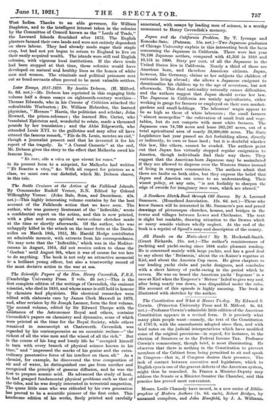Japan and the California Problem. By T. Iyenaga and Kenoake
Sato. (Putnam. 15s. net.)—Two Japanese graduates of Chicago University explain in this interesting book the facts concerning the Japanese in California. There were last year 70,196 Japanese settlers, compared with 41,356 in 1910 and 10,151 in 1900. Sixty per cent. of all the Japanese in the United States live in California. Nearly a third of these are American born, and therefore American citizens. Japan, however, like Germany, claims as her subjects the children of nationals living abroad ; she allows a Japanese emigrant to denationalize his children up to the age of seventeen, but not afterwards. This dual nationality naturally causes difficulties, and the authors suggest that Japan should revise her law. The Japanese in California are mainly agriculturists, either working in gangs for farmers or employed on their own market- gardens and small-holdings. The labourers' wages appear to be as high as those of white labourers ; the small farmers
almost monopolize " the cultivation of small fruit and vege- tables, but do not compete with most white farmers. The Japanese own 74,769 acres and lease 383,287 acres, out of a total agricultural area of nearly 28,000,000 acres. The State Legislature last year passed an Act forbidding aliens, directly or indirectly, to own or lease land ; but it is doubtful whether this law, like others, cannot be evaded. The authors point out that Japan has virtually stopped regular emigration to America, though individuals find their way there. They suggest that the American-born Japanese may be assimilated if they are allowed to disperse over the Western States instead of living in compact communities. The authors admit that there are faults on both sides, but they express the belief that Japan and America can come to an understanding. Their wisest policy, at any rate, " is not foolishly to sharpen the edge of swords for imaginary race wars, which are absurd."


































 Previous page
Previous page